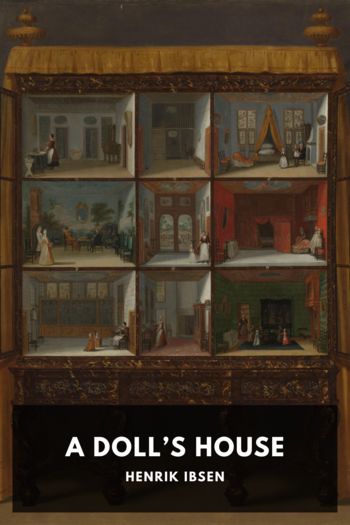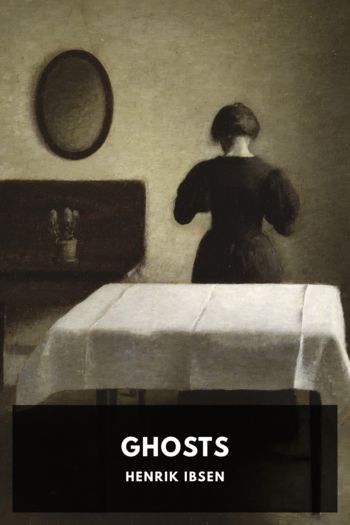Hedda Gabler by Henrik Ibsen (no david read aloud .TXT) 📕

Description
Hedda, the proud and willful daughter of General Gabler, newly married to George Tesman, returns from her honeymoon to Norway. She chafes at the prospect of a dull life in a loveless marriage until a former lover, Eilert Løvborg, returns and throws their financial future into disarray. The appearance of Hedda’s old schoolmate Thea, who wants to reform Løvborg, and Judge Brack, who wants Hedda in his power, leave her struggling to build the life she wants.
Hedda Gabler was first performed in Munich in 1891, and within months there were productions in Berlin, Copenhagen, London, and New York. It was Ibsen’s first play to be translated from proofs before performance or publication. Productions of the play have won two Olivier Awards and been broadcast in multiple countries; since 1917, it has been adapted into more than a dozen feature films in almost as many languages.
Read free book «Hedda Gabler by Henrik Ibsen (no david read aloud .TXT) 📕» - read online or download for free at americanlibrarybooks.com
- Author: Henrik Ibsen
Read book online «Hedda Gabler by Henrik Ibsen (no david read aloud .TXT) 📕». Author - Henrik Ibsen
Here ends the history of Hedda Gabler, so far as the poet’s letters carry us. Its hard clear outlines, and perhaps somewhat bleak atmosphere, seem to have resulted from a sort of reaction against the sentimental “dreamery” begotten of his Gossensass experiences. He sought refuge in the chill materialism of Hedda from the ardent transcendentalism of Hilda, whom he already heard knocking at the door. He was not yet in the mood to deal with her on the plane of poetry.3
Hedda Gabler was published in Copenhagen on December 16, 1890. This was the first of Ibsen’s plays to be translated from proof-sheets and published in England and America almost simultaneously with its first appearance in Scandinavia. The earliest theatrical performance took place at the Residenz Theater, Munich, on the last day of January 1891, in the presence of the poet, Frau Conrad-Ramlo playing the title-part. The Lessing Theater, Berlin, followed suit on February 10. Not till February 25 was the play seen in Copenhagen, with Fru Hennings as Hedda. On the following night it was given for the first time in Christiania, the Norwegian Hedda being Froken Constance Bruun. It was this production which the poet saw when he visited the Christiania Theater for the first time after his return to Norway, August 28, 1891. It would take pages to give even the baldest list of the productions and revivals of Hedda Gabler in Scandinavia and Germany, where it has always ranked among Ibsen’s most popular works. The admirable production of the play by Miss Elizabeth Robins and Miss Marion Lea, at the Vaudeville Theatre, London, April 20, 1891, may rank as the second great step towards the popularisation of Ibsen in England, the first being the Charrington-Achurch production of A Doll’s House in 1889. Miss Robins afterwards repeated her fine performance of Hedda many times, in London, in the English provinces, and in New York. The character has also been acted in London by Eleonora Duse, and as I write (March, 5, 1907) by Mrs. Patrick Campbell, at the Court Theatre. In Australia and America, Hedda has frequently been acted by Miss Nance O’Neill and other actresses—quite recently by a Russian actress, Madame Alla Nazimova, who (playing in English) seems to have made a notable success both in this part and in Nora. The first French Hedda Gabler was Mlle. Marthe Brandes, who played the part at the Vaudeville Theatre, Paris, on December 17, 1891, the performance being introduced by a lecture by M. Jules Lemaitre. In Holland, in Italy, in Russia, the play has been acted times without number. In short (as might easily have been foretold) it has rivalled A Doll’s House in worldwide popularity.
It has been suggested,4 I think without sufficient ground, that Ibsen deliberately conceived Hedda Gabler as an “international” play, and that the scene is really the “west end” of any European city. To me it seems quite clear that Ibsen had Christiania in mind, and the Christiania of a somewhat earlier period than the ‘nineties. The electric cars, telephones, and other conspicuous factors in the life of a modern capital are notably absent from the play. There is no electric light in Secretary Falk’s villa. It is still the habit for ladies to return on foot from evening parties, with gallant swains escorting them. This “suburbanism,” which so distressed the London critics of 1891, was characteristic of the Christiania Ibsen himself had known in the ‘sixties—the Christiania of Love’s Comedy—rather than of the greatly extended and modernised city of the end of the century. Moreover Lovborg’s allusions to the fjord, and the suggested picture of Sheriff Elvsted, his family and his avocations are all distinctively Norwegian. The truth seems to be very simple—the environment and the subsidiary personages are all thoroughly national, but Hedda herself is an “international” type, a product of civilisation by no means peculiar to Norway.
We cannot point to any individual model or models who “sat to” Ibsen for the character of Hedda.5 The late Grant Allen declared that Hedda was “nothing more nor less than the girl we take down to dinner in London nineteen times out of twenty”; in which case Ibsen must have suffered from a superfluidity of models, rather than from any difficulty in finding one. But the fact is that in this, as in all other instances, the word “model” must be taken in a very different sense from that in which it is commonly used in painting. Ibsen undoubtedly used models for this trait and that, but never for a whole figure. If his characters can be called portraits at all, they are composite portraits. Even when it seems pretty clear that the initial impulse towards the creation of a particular character came from some individual, the original figure is entirely transmuted in the process of harmonisation with the dramatic scheme. We need not, therefore, look for a definite prototype of Hedda; but Dr. Brandes shows that two of that lady’s exploits were probably suggested by the anecdotic history of the day.
Ibsen had no doubt heard how the wife of a well-known Norwegian composer, in a fit of raging jealousy excited by her husband’s prolonged absence from home, burnt the manuscript of a symphony which he had just finished. The circumstances under which Hedda burns Lovborg’s manuscript are, of course, entirely different and infinitely more dramatic; but here we have merely another instance of the dramatisation or “poetisation” of the raw material of life. Again, a still more painful incident probably came to his knowledge about the same time. A beautiful and very intellectual woman was married to a well-known man who had been addicted





Comments (0)